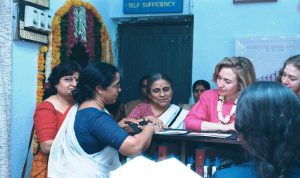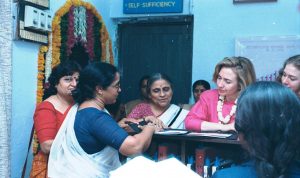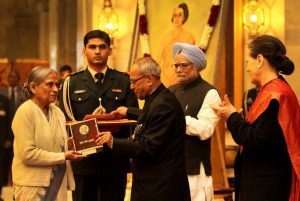Ela Bhatt, a well-known advocate for women’s rights and a winner of the Padma Bhushan, passed away on November 2 at the age of 89 at an Ahmedabad hospital. She had a brief illness that required hospital admission. Bhatt founded the Self-Employed Women’s Association of India (SEWA) in 1972.
What is SEWA?
Located in Ahmedabad, India, the Self-Employed Women’s Association (SEWA), whose name translates as “service” in numerous Indian languages, advocates for the rights of low-wage, self-employed female workers. SEWA is the world’s largest association of informal labourers, with over 1.6 million female members.
Also Read| Ela Bhatt, Padma Bhushan recipient and women’s rights activist, dead at 89
Women who work for themselves are individuals whose lives and income are more unstable because they do not receive a wage comparable to that of formally hired workers. With full employment, a woman can provide for her family’s needs in terms of money, food, health care, child care, and shelter. The guiding principles of SEWA are struggle and development, which refer to interacting with stakeholders and offering services, respectively.
With 30,000 members in 1996, 318,527 in 2000, and 1,919,676 in 2013, the group expanded quite swiftly. A transformation in India’s economy and society is happening at the same time as this increase in members.
Since the financial crisis of 2008, over 90% of India’s working population has been employed in the informal sector (Shakuntala 2015), but 94% of working women in 2009 were employed in the informal sector. This is because the 1991 liberalisation of the economy to foreign trade resulted in a massive migration of rural residents to Indian cities, which then forced urban residents into these occupations (Bhatt 2009). Because of traditional gender norms that prevent women from participating in regular, stable types of employment, India’s history and contemporary culture of female subjection also contribute to this imbalance.
Also Read| Who was Ela Bhatt?
The major objectives of SEWA are to mobilise female workers for self-reliance and full employment. SEWA seeks to uplift marginalised, underprivileged women from poverty by integrating them into the informal economy. Their members can support their families financially while also caring for their youngsters and ageing relatives. They also manufacture affordable goods for both domestic and international markets. As a result, they give low-income individuals the opportunity to buy affordable goods and services.
Numerous law firms, including HSA, have dealt with SEWA and provided advice.





